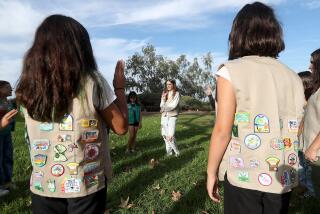When Good Deeds Multiply
- Share via
There was no badge for collecting during Phil Parlett’s Boy Scout days in the ‘60s, but that didn’t stop him from acquiring a museum’s worth of Scout artifacts. Then again, Parlett never really left Scouting. At 52, the West L.A. financial services specialist has logged 45 years with the Boy Scouts of America, working his way from Cub Scout to Eagle Scout and later Scout leader, Scoutmaster, explorer, advisor and commissioner. Today he serves on the executive board of the Western Los Angeles County Council.
As a teenage Boy Scout in Venice, Parlett began digging into the movement’s history by quizzing old hands such as his late mentor, Scoutmaster Bill van Slyke. The older men often handed over outdated manuals and other historic knickknacks. “It was like tracing my roots,” Parlett says.
Volumes have been devoted to the uniformed boys’ organizations that appeared in Britain during the late 1800s. The British Boy Scout Assn., founded by Boer War hero Lord Baden-Powell in 1907, became the West’s preeminent group, reaching America in about 1910. (In totalitarian states, imitation versions such as Nazi Germany’s Hitler Youth and the Soviet Union’s Young Pioneers doubled as propaganda machines.)
Parlett’s memorabilia centers on the Boy Scouts of America, its family tree and Baden-Powell ephemera. It includes about 100 American and British uniforms dating from 1907, more than 50,000 international Scout pins, patches and badges, a trove of troop flags and camping gear, and about 4,000 books. Many items originated with the competing boy scout groups that sprouted in America before Congress chartered Boy Scouts of America for sole use of the name in 1916. A working rifle used for drills by William Randolph Hearst’s paramilitary-oriented U.S. Boy Scouts hangs behind Parlett’s desk, while scouting’s more leftward ancestry is represented by his manuscripts and rare volumes by pioneering environmentalist and pacifist Ernest Thompson Seton, who collaborated with Baden-Powell on the original Boy Scouts of America handbooks.
From 1986 to 1998, Parlett showcased the memorabilia at his privately run Western Museum of Scouting, next door to his West L.A. office. But the collection outgrew the space and Parlett now exhibits the artifacts only at Scouting events. He’s currently seeking a larger location for the museum.
Parlett freely admits that Scouting has been a sort of family for him. “My parents died when I was very young and I went to live with some relatives back East.” The predicament, he remembers, was bad, with resentful step-siblings and abusive stepparents. “My grandmother lived in Venice, so I wrote her all these letters begging to move [back to California]. I was 12, and she was 80 and living on Social Security, but she took me in.” Scouting gave him the independence he needed to make that situation work. “Without the Scouts,” he says, “I’d have probably ended up in reform school.”
More to Read
Sign up for The Wild
We’ll help you find the best places to hike, bike and run, as well as the perfect silent spots for meditation and yoga.
You may occasionally receive promotional content from the Los Angeles Times.





